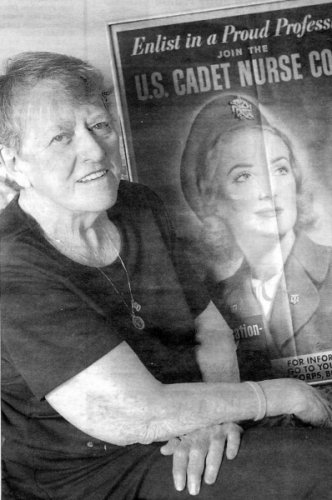Town of Wallkill - At some point in her second or third year of training with the U.S. Cadet Nurse Corps, Rose Mary Tyndall found herself in a Bellevue Hospital room attending to a young boy with blond hair and a mysterious asthma condition.
World War II was well under way, and most able-bodied staff at the New York City hospital had gone off to fight. As Tyndall comforted the boy by playing games and telling him stories, she was fully aware of the hundreds of other patients she and two other nurses were responsible for.
Although they were denied permission to serve overseas, the nurse cadets took comfort knowing they were fulfilling a crucial wartime role, she said.
"The surgeon general at the time said that we prevented the total collapse of health care in the United States during the war," said Tyndall, 82, who lives in the town of Wallkill.
Tyndall and the remaining members of the once 150,000-strong nurse corps are fighting for recognition from the U.S. government for their wartime service.
But since a bill to grant veteran status to corps members was first introduced in Congress in the mid-1990s, legislators have refused to approve it. The U.S. Cadet Nurse Corps Equity Bill is still being studied by congressional veterans committees.

"It would be recognizing them to have flags on their graves and final honors ... so they get their rightful place in history," said Tyndall, who joined the first class in 1943.The U.S. government has cited several arguments for denying the nurses veteran status, including that they did not carry weapons and did not belong to a military branch.
The corps contends that Army medical staff are not considered combatants, and that two U.S. presidents have stated that the nurse corps members served under a government department that is part of the armed forces during wartime.
Government denial of veteran status devalues the role the U.S. Cadet Nurse Corps played in the war, as well as the role of nurses in general, Tyndall argues.
The shortage of hospital staff during World War II made cadets like Tyndall indispensable at homeland hospitals, she said. Though they were only trainees, the cadets at Bellevue quickly found themselves handling tasks performed by more experienced nurses and even young medical students, Tyndall said.
Tyndall's first leave occurred after nearly 80 straight hours of work that left her hospitalized for exhaustion, she said. In between shifts, she would study the courses in her nursing speciality.
On days off, she and other nurse cadets volunteered to man phones and reception desks.
Few today realize that the nurses looked after 75 patients at a time with very limited help, she said.
"If that isn't service, then I don't know what is," she said.